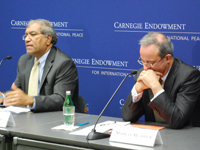Registration
You will receive an email confirming your registration.
With the Palestinian-Israeli peace process halted and little hope for resuming direct talks, Palestinians are discussing the possibility of an alternative strategy for achieving statehood. Khalil Shikaki, director of the Palestinian Center for Policy and Survey Research in Ramallah, discussed the latest breakdown in the peace talks and the evolving Palestinian strategy for statehood. Carnegie’s Marwan Muasher moderated.
Moving Forward After Failed Peace Talks
- Cultivating an environment conducive to state-building: Fatah must work to create the conditions necessary for strengthening Palestinian institutions. According to Shikaki, coordination between Fatah and Israeli security services has greatly enhanced stability in the West Bank, and Abbas is likely to continue cooperating with Israel to create the conditions necessary to develop strong institutions.
- Avoiding a resurgence of violence: Fatah has a strong interest in avoiding an outbreak of popular violence, which occurred following the collapse of the Camp David negotiations in 2000. Such violence would only undermine the Palestinian leadership and might even force Abbas to negotiate a power-sharing arrangement with Hamas.
- No incentives for a Fatah-Hamas reconciliation: Fatah is reluctant to reconcile with Hamas because such a move would erode its political capital, Shikaki said. Therefore, the search for a new strategy is largely motivated by Abbas’s desire to avoid this scenario. Hamas also has a strategic interest in blocking any sort of reconciliation with Fatah to avoid alienating its regional sponsors, including Hizbollah and Iran.
The New Fatah Strategy
Shikaki outlined a four-point strategy that Fatah is likely to implement in the coming months. This new plan is based on the assumption that meaningful progress on the peace process cannot be achieved as long as Prime Minister Benjamin Netanyahu’s right-wing coalition remains in power. Negotiations between the two sides have been impeded by Netanyahu’s insistence on settlement expansion and other policies that are fundamentally unacceptable to the Palestinian leadership, Shikaki added.
- Arabization: According to Shikaki, Abbas will increasingly seek to mobilize the support of other Arab states by “transforming Palestinian positions into Arab positions.” In rallying regional allies behind Fatah’s agenda, Abbas aims to bolster his own political legitimacy as well as marginalize Hamas.
- Internationalization: In response to growing international support for Palestinian statehood, Abbas will likely seek to advance his state-building agenda through two international fora: the Quartet (the United Nations, the United States, the European Union, and Russia) and the UN Security Council. A Security Council vote on Israeli settlements, borders, and the status of Jerusalem would confer legitimacy on Palestinian claims to sovereignty, Shikaki said.
- Unilateralism: Given the difficulties of negotiating with Netanyahu’s government, Fatah might attempt a unilateral declaration of statehood.
- Delegitimizing the occupation: Shikaki drew a distinction between delegitimizing Israel’s policies and challenging the legitimacy of the Israeli state itself. He predicted that Fatah will continue to attempt the former by mobilizing international public opinion in support of Palestinian statehood. According to Shikaki, Fatah’s leadership will also seek to promote the Palestinian case by highlighting illegal Israeli policies like the Gaza blockade and by channeling Palestinian demands for resistance into passive, non-violent strategies.
A Pessimistic Prognosis
Current political conditions do not bode well for the success of the four-point strategy, Shikaki admitted. As long as the Israeli and Palestinian governments resist compromise, progress toward a two-state solution will be limited. Despite these formidable obstacles to a negotiated resolution, Shikaki identified a few positive trends:
- Political will to advance the peace process: The United States has demonstrated great interest in reviving the peace process over the last six months, and Palestinian and Israeli leaders are more committed to ending the conflict than they were in 2000.
- Stronger Palestinian institutions: As a result of Fatah’s state-building initiatives, Palestinian institutions are displaying an unprecedented degree of accountability and transparency, and are more capable of enforcing law and order than in the past, Shikaki argued.
- Moderate voices in the Knesset: Although Netanyahu’s right-wing government has refused to grant key concessions on the issues of settlement expansion and the status of Jerusalem , centrist and moderate members of the Knesset, as well as Israeli Arabs, are amenable to compromise.
- The weakening of Hamas: Hamas lost credibility following its violent takeover of Gaza in 2007. Shikaki contended that its diminished influence in the political arena has allowed Fatah to advocate more effectively for Palestinian statehood.
- Strong leadership: Shikaki described Mahmoud Abbas as “the ideal Palestinian leader to end the conflict with Israel.” As a pragmatist, rather than an ideologue, Abbas is better positioned to advance the peace process than any Palestinian leader in the past century, Shikaki said.
